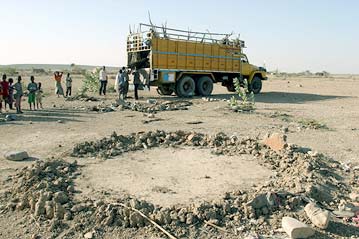Camp closure brings UNHCR closer to phase-out from eastern Ethiopia
Camp closure brings UNHCR closer to phase-out from eastern Ethiopia

AISHA CAMP, Ethiopia, June 29 (UNHCR) - The UN refugee agency has officially closed Aisha refugee camp in eastern Ethiopia a month after its last Somali residents went home. This leaves just one camp in an area that used to host the world's largest concentration of refugees.
At its peak in the early 1990s, there were 628,000 Somali refugees in eight camps in eastern Ethiopia. Since UNHCR began repatriating refugees to north-western Somalia, better known as the self-declared Republic of Somaliland, in 1997, most of the camps have been consolidated and finally closed. Aisha is the seventh camp to close in eastern Ethiopia.
At the closing ceremony on Monday, UNHCR Deputy Regional Liaison Representative Fernando Protti Alvarado thanked the host community and the government for their hospitality to the refugees and for the peaceful co-existence despite the obvious fact that refugees add to the strain on local resources.
He handed over the land and all the facilities used by the refugees to the Administrator of Aisha woreda (district), Ferhan Ibrahim. Worth about US$158,000, these assets included the offices of UNHCR and its main government counterpart ARRA (Authority for Refugees and Returnees Affairs), a health centre, a school, a women's community centre, a grinding mill, a warehouse, a food distribution centre, a borehole, a motorised water pumping system and a generator house with a generator.
Protti assured representatives of the local government and elders that UNHCR would take care of the repair and maintenance of the school, health centre and water facility, and replace the old generator with a new one. These tasks should be finalized in two weeks.
The local administration and elders had requested UNHCR to help run the facilities for an interim period until the local government develops the requisite capacity to manage them well. "We would have liked to do so," responded Protti. "But since UNHCR is a humanitarian agency dealing with refugees and not a development organisation, the local government has to be able to take the full responsibility of managing the facilities."
Ato Ayalew Aweke, a senior ARRA official, witnessed the handover ceremony at Aisha woreda. He echoed Protti's words of gratitude to the local administration and the Aisha community for their hospitality to the refugees.
"We are aware of the adverse impact on the environment as a result of the presence of refugees for the last 16 years. However, this should be taken as a cost a nation must pay to honour its international obligations," said the Ethiopian official.
The Somalilanders in Aisha camp fled civil war in the 1980s and the overthrow of the Siad Barre regime in 1991. The camp was opened in November 1989 and counted 13,986 refugees in 2003 before repatriation began. Voluntary repatriation from Aisha started in May 2004 and ended in May this year, with the last convoy, the 213th since repatriation started in 1997, leaving the camp on May 28.

With the closure of this camp, UNHCR has assisted home some 240,000 Somali refugees, not to mention of the hundreds of thousands of others who have returned on their own. "This milestone brings us one step closer to phasing out our operation in eastern Ethiopia, an area which 15 years ago was the largest refugee-hosting area in the world," said UNHCR's Protti.
Only one camp - Kebribeyah - remains in eastern Ethiopia now. It houses over 10,000 refugees who are from other parts of Somalia where it is not safe to return. UNHCR expects to repatriate the refugee population there and to close the camp and phase out its eastern Ethiopian operation once the situation in Somalia stabilises.
By Kisut Gebre Egziabher in Aisha camp, Ethiopia








